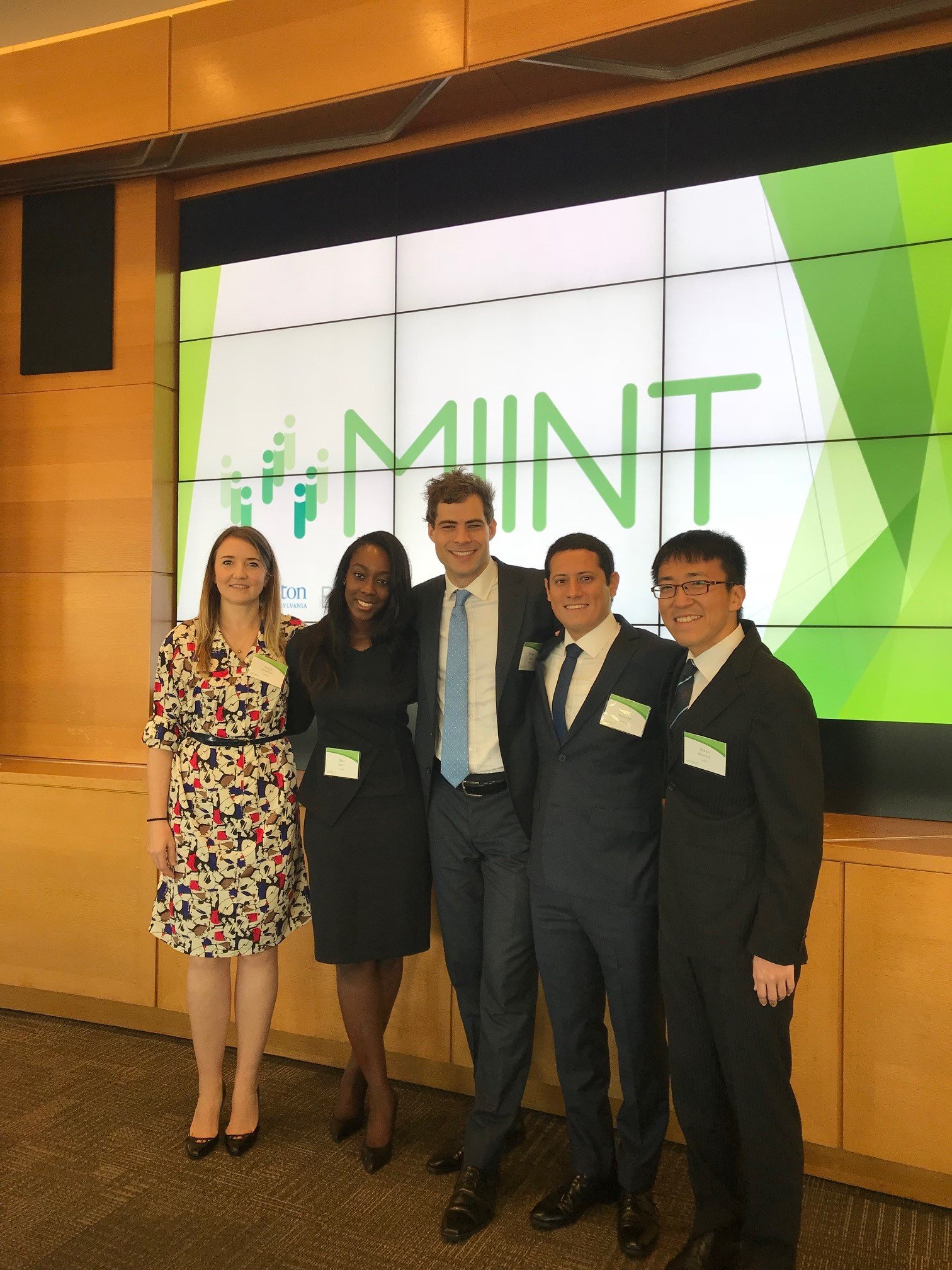
MBA Social Impact Competition - MIINT
2018 marked the second year of INSEAD’s participation in an annual inter-business school competition called the MBA Impact Investment Network and Training programme, also known as the MIINT. The authors of this post are 18J candidates from Australia and Peru and will graduate from the INSEAD MBA programme in July. They are pleased to share some of their reflections on the programme with the wider INSEAD community, both present and future, and trust you enjoy the read!
Now in its seventh year, the MIINT program is facilitated by impact investment firm Bridges Fund Management in conjunction with the Wharton Social Impact Initiative at the University of Pennsylvania.
The objective of the programme is to provide MBA students with hands-on experience and training in the field of impact investing, and in doing so, train the next generation of impact investors.
The programme runs from October to April each year and is structured to simulate a real-life impact investment process where students source, conduct due diligence, and present an early stage impact investment idea to an expert judging committee. The programme culminates at the final investment committee weekend in Philadelphia, where one team from each business school presents their selected company to the panel and competes for an up to $50,000 investment into the startup. The investment capital is provided by a third-party supporter of MIINT, and as such there are criteria the selected company must meet, such as its size and stage, the investment type, and the company must be raising capital (separate to the MIINT investment).
In late September, shortly after commencing our MBA, INSEAD formed a team of more than twenty students across both France and Singapore campuses, and set about sourcing an impact investee. This was arguably one of the toughest yet most enjoyable aspects of the competition. The team set an internal goal for each member to source four to five potential candidates, which, in addition to the MIINT requirements, focused on three main criteria: (a) What would happen in terms of social impact if this company does not exist (i.e. what is the additionality of the business); (b) to what extent do the financial and social returns move in lock-step; and (c) what is the company’s ability to scale up the business, and hence scale the social impact contemporaneously?
The team leveraged diverse student backgrounds and presence across multiple campuses to source startups from Latin America to Africa, Europe, and Asia. Some of the companies had a clear intention to generate impact but a less robust business model, while others had strong business propositions yet the intention and capability to effectively measure the social impact was questionable. In the end, 60–70 startups were uncovered, and the team’s challenge was to select candidate(s) with the most attractive balance of these elements. This selection process was particularly challenging, requiring a rigorous and systematic assessment of a range of companies with very different business models, in different jurisdictions and with different risk profiles. It also allowed us to apply our MBA learnings into practical scenarios, and ultimately two businesses were chosen for detailed due diligence: a UK-based sustainable fishing company, and an EduTech platform in Africa.
One of the great aspects of the MIINT programme is that it provides relevant training modules for all participating students in parallel with the programme deliverables. This allows students from all professional backgrounds, whether they have had impact investment experience or not, to fully engage in the programme, and maximise their learning about the social impact field. Importantly, the team completed the programme with a clearer understanding as to what the impact investment field involves, an improved ability to “think like an impact investor”, and inspiration to pursue further work in this field.
In mid-April, the INSEAD team presented the UK-based sustainable fishing business at the final at the Wharton School in Philadelphia – pitching against 24 other leading business schools. Over the preceding two months, we had worked closely with the company’s management team to understand and position the company’s business model, impact potential and market opportunity, and prepared a detailed investment thesis and final pitch.
The selected startup designs and builds light emitting devices that increase the selectivity of commercial fishing practices. The company has developed innovative and market-leading technology that can attract particular species and sizes of fish, whilst repelling unwanted fish. This technology drastically reduces bycatch (the unintentional capture of non-commercial fish), making the fishing industry and global marine eco-system more sustainable.
It was a privilege to work intimately with the management team over a number of months, and the team’s belief in what this venture offers the world allowed us to present the company with passion and conviction.
While MIINT is a significant time commitment during the INSEAD MBA, our involvement in the MIINT programme over the last six months has been a valuable and enriching part of our MBA journey. MBA programmes bring people together from all walks of life, and MIINT provides a unique forum which allows passionate students with a shared interest in impact investing to learn more, do more, and inspire one another. Most importantly, this programme has been a great deal of fun, and representing INSEAD on the international stage is a memory that will stay with us long after we leave the campus grounds at INSEAD. Thank you to everyone – the MIINT team, fellow students, faculty, advisers and alumni – who have been part of the MIINT 2018 programme and supported us. For future students, we cannot recommend it highly enough! Best wishes!




